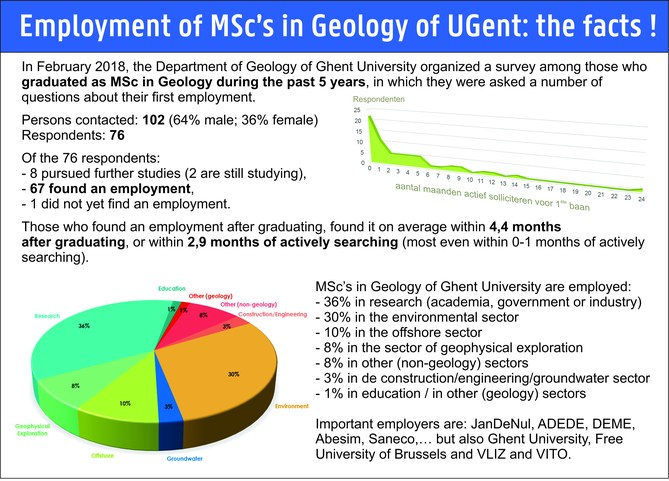Why study Geology?
Study Geology
The education in Geology is organized by the Faculty of Sciences. This already shows something about the nature of the education: scientific courses, such as physics, chemistry and mathematics, are the cornerstones the education is based upon.
With specific techniques, based on these basic sciences, geology investigates the subterranean world. Geological knowledge not only is important because of the science in itself, but has a multitude of practical approaches: the exploration of natural resources (ores, oil and gas, water, ...), the understanding and prediction of natural disasters (earthquakes and tsunamis, volcano eruptions, ...) and so on. Also the understanding of out planets climate throughout time falls under the scope of geology. Because of this wide variety, several specializations have emerged, which are described in detail in the brochure 'Geology' (in Dutch), published by the Student Counselling Office.
What does the education offer?
The full program is composed of a three year Bachelor program(180 credits) and a two year Master program (120 credits).
The Faculty of Sciences and the Department of Geology commit themselves to offer a sound education, based on a strong concept. The goal is the delivery of a certificate with which the geologist from Ghent is - both nationally and internationally - recognised as a specialist in his/her field.
Fieldwork
In order to gather the data needed for the reconstruction of the geological history the geologist applies different techniques, including field work. The idea that geologists spend half their lives in remote deserts and that the profession is only for a type of men that has the Mount Everest for breakfast, is however outdated.
Field work still has an important role to obtain certain sorts of information (which rock types are in which areas, or in which way do the geological layers tilt?) and for the acquisition of samples, but is no longer the single most important technique by which geology is done.
From well to lab
Drilling wells only reach a depth of several kilometers and are also expensive. This means that the deepest parts of the Earth can only be studied by means of so-called indirect methods: research on the internal structure of the planet by gravity, Earth's magnetic field, the way by which waves propagate through the Earth, the material brought to the surface by volcanoes, ...
Due to the fast innovations in technology, the geologist also spends more and more time outside the field. A big part of information is obtained from satellite image analysis, gravity measurements, seismic waves, sample analysis, ...: all things that are rather being done in the laboratory than on the field.
Geologist, nonetheless still make use of the familiar direct observation on the spot or from research on drilling wells, but the emphasis has for a major part shifted from the field to the laboratory and computer (modelling) environments.
Choosing for Ghent University
De Education Geology is housed into the S8 building on Campus Sterre, situated on less than 1 kilometer from the Sint-Pieters train station and barely 500 meters from the E17 and E40 motorways. The student home Astrid is situated right across the building. The student restaurant and the faculty library are also nearby, in building S5.
All of this gives the studies of Geology in Ghent a unique character, with all factors for an optimal personal contact between students and academic staff members.
Future perspective
A recent survey by the Department of Geology at Ghent University revealed where our alumni find employment:
